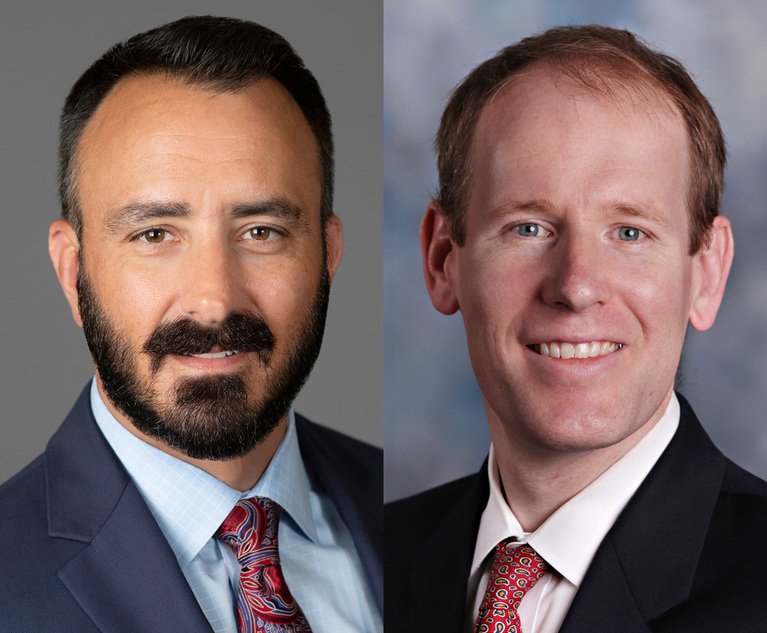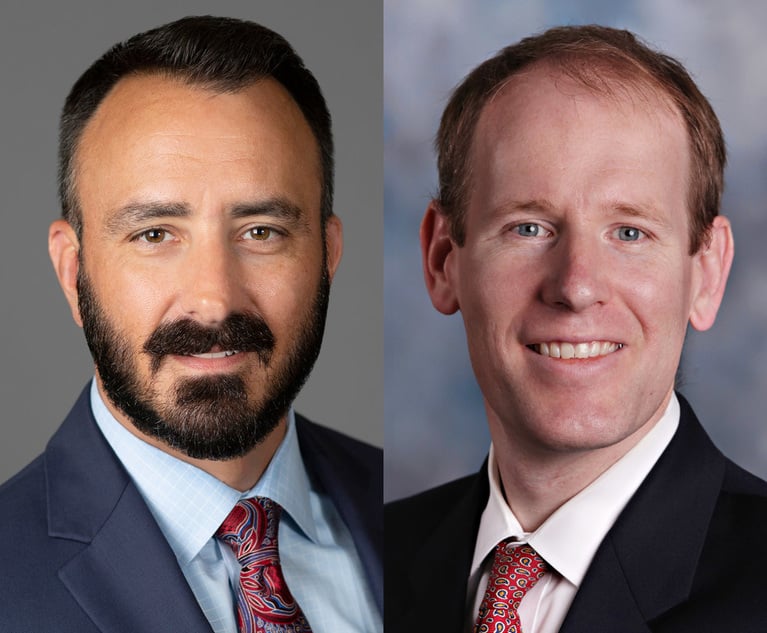Christopher J Tellner

August 23, 2023 | The Legal Intelligencer
The Movement Toward Increased Federal Jurisdiction Over Insurance Declaratory Judgment ActionsIn the U.S. Court of Appeals for the Third Circuit, district courts exercising their discretion under the DJA are guided by the landmark opinion in Reifer v. Westport Insurance, 751 F.3d 129 (3d Cir. 2014). Reifer sets forth the factors a district court must address when deciding whether to abstain from hearing an insurance coverage declaratory judgment action.
By Christopher J. Tellner and Gregory Brown
8 minute read

March 28, 2023 | The Legal Intelligencer
Physician Unionization—Penn Residents, Fellows Bring Debate to PhiladelphiaAs the strain on health care workers imposed by COVID-19 passes, it is an open question whether Penn will be the exception or the rule for hospitals in Pennsylvania.
By Gregory F. Brown, Alexandra E. Lynch, Christopher J. Tellner and Gregory S. Hyman
7 minute read

October 13, 2022 | The Legal Intelligencer
Court Allows COVID-19 Negligence Claim to Proceed Against Long-Term Care FacilityIn a surprising ruling for nursing facilities throughout Pennsylvania and elsewhere, the U.S. District Court for the Eastern District of Pennsylvania declined to dismiss a complaint against a nursing home alleging negligence in protecting residents from COVID-19 in the early days of the pandemic.
By Christopher J. Tellner and Gregory F. Brown
6 minute read

September 12, 2022 | The Legal Intelligencer
At Odds With 'Occurrences' in Pennsylvania Faulty Workmanship ClaimsHere we are again. When last writing on this topic in 2018, courts within the commonwealth consistently ruled that faulty workmanship and negligent construction do not rise to the level of an "occurrence" in commercial general liabilities (CGL) policies.
By Christopher J. Tellner
8 minute read

March 28, 2022 | The Legal Intelligencer
Medical Professional Liability Lawsuit Venue—New Post-COVID ConsiderationsIn 2018, the Supreme Court of Pennsylvania Civil Procedural Rules Committee (rules committee) proposed elimination of Rule 1006(a.1) (venue rule), which requires that a medical professional liability action be brought in "a county in which the cause of action arose."
By Christopher J. Tellner, Abbye E. Alexander and Gregory F. Brown
8 minute read
August 29, 2018 | FC&S Insurance
Declaratory Judgment Actions in Faulty Workmanships Claim SubmissionsNo matter how much lipstick claimants and policyholders put on claims arising from faulty workmanship, they still remain a nonoccurrence under CGL policies.…
By Christopher J. Tellner
8 minute read

August 23, 2018 | The Legal Intelligencer
Declaratory Judgment Actions in Faulty Workmanships Claim SubmissionsNo matter how much lipstick claimants and policyholders put on claims arising from faulty workmanship, they still remain a nonoccurrence under CGL policies.
By Christopher J. Tellner
8 minute read
September 28, 2017 | FC&S Insurance
Affirmative Duty to Defend: How the Four Corners Approach Is ModifiedIn the field of insurance law, most liability policies are designed to cover two primary and qualified contractual obligations assumed by the insurer—a…
By Christopher J. Tellner and Benjamin R. Messing
7 minute read

August 30, 2017 | The Legal Intelligencer
Affirmative Duty to Defend: How the Four Corners Approach Is ModifiedIn the field of insurance law, most liability policies are designed to cover two primary and qualified contractual obligations assumed by the insurer—a defense expense obligation and an indemnification expense obligation. How the defense expense obligation is actually implemented through policy language can vary greatly between types of liability policies. The most frequently encountered liability policies—home, auto, commercial—implement the defense expense component through what is known as a duty to defend provision, in which the insurer assumes control of the defense of a claim and appoints defense counsel to represent the policyholder. However, there is another category of liability policies that do not contain a duty to defend provision but instead contain a duty to advance defense costs provision. These are typically found in higher exposure liability policies such as directors and officers (D&O), employment practices liability (EPL), or individual and organization (I&O) policies, where the policyholder, not the insurer, controls selection of counsel and exercises primary control over litigation, albeit with some limitations. Often, policies containing a duty to advance defense costs explicitly state at the outset that the insurer disclaims any duty to defend. This disclaimer, however, does not end the inquiry. Since policies containing a duty to advance defense costs are less frequently encountered by courts there is limited legal authority interpreting duty to advance provisions. We examine the differences between these two types of polices and how courts applying Pennsylvania law have addressed the topic. As discussed below, despite a duty to defend disclaimer, policies that contain a duty to advance defense costs provision most often are examined under the traditional duty to defend analysis.
By Christopher J. Tellner and Benjamin R. Messing
7 minute read
Trending Stories
- 1Is It Time for Large UK Law Firms to Begin Taking Private Equity Investment?
- 2Federal Judge Pauses Trump Funding Freeze as Democratic AGs Launch Defensive Measure
- 3Class Action Litigator Tapped to Lead Shook, Hardy & Bacon's Houston Office
- 4Arizona Supreme Court Presses Pause on KPMG's Bid to Deliver Legal Services
- 5Bill Would Consolidate Antitrust Enforcement Under DOJ



